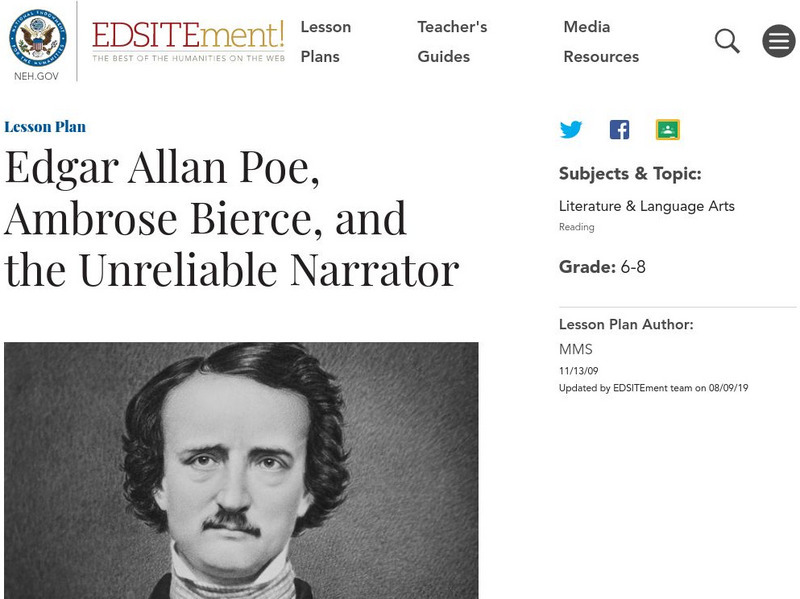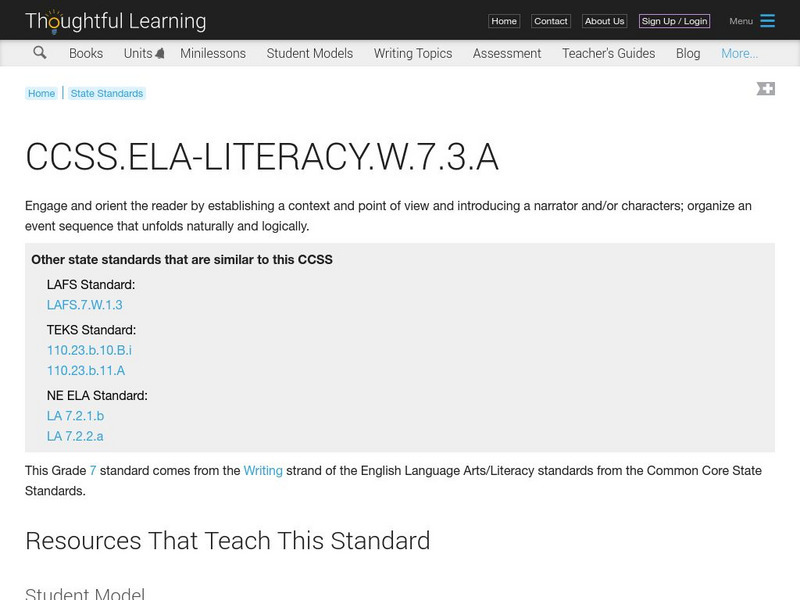Curated OER
What? Did Caesar Swoon?
Students discover the "dumb show," a scene that enacts a story silently while focusing on an example from Hamlet. Divided into groups, they act out the silent scene from the play. Again, in groups, they create a "dumb show" from Julius...
Texas Education Agency
Texas Gateway: Point of View and Tone (English Ii Reading)
[Accessible by TX Educators. Free Registration/Login Required] Evaluate connections between forms of narration (unreliable narrator, omniscient, etc.) and tone in works of fiction.
Department of Defense
Do Dea: English 4; Utopia
A learning module asking students to analyze different types of texts, connect literature to events and experiences, use various writing skills, deconstruct media, practice grammar and vocabulary skills, and analyze point of view,...
Better Lesson
Better Lesson: Examining Point of View
Who is telling the story? Students analyze whose eyes the reader is looking through. Students will learn that there is more to point of view than knowing who is telling the story. This lesson will teach them about the nuances of the...
National Endowment for the Humanities
Neh: Edsit Ement: Edgar Allan Poe, Ambrose Bierce, and the Unreliable Narrator
For this lesson plan, students will consider Edgar Allan Poe, Ambrose Bierce, and the Unreliable Narrator. Worksheets and other supporting materials can be found under the Resources tab.
National Endowment for the Humanities
Neh: Edsit Ement: Lesson 5: Faulkner's the Sound and the Fury: April Eighth, 1928
In this lesson plan, students will consider Lesson 5: Faulkner's The Sound and the Fury: April Eighth, 1928: Narrating from an 'Ordered Place'?. Worksheets and other supporting materials can be found under the Resources tab.
National Endowment for the Humanities
Neh: Edsit Ement: Lesson 4: Faulkner's the Sound and the Fury
For this lesson plan, students will consider Lesson 4: Faulkner's The Sound and the Fury: Narration, Voice, and the Compson Family's New System. Worksheets and other supporting materials can be found under the Resources tab....
Curated OER
Mc Graw Hill: Compare Points of View Narrator
Read a passage from a story to determine who is the narrator and what is the narrator's point of view. An additional practice exercise is available. CCSS.ELA-Literacy.CCRA.R.6
Other
Meeting Characters in Literature: Point of View
A very clear explanation of narrator and point of view in literature. Because of the structure of the page and the use of highlighting, upper elementary students should be able to use this to help them understand the concepts, as well as...
Houghton Mifflin Harcourt
Holt, Rinehart and Winston: Elements of Literature: Narrator Chart [Pdf]
Provides an overview of the importance of a narrator in a text and some brief exercises for analysis. Helps students learn more about the role of the narrator in literature, his/her voice, and influence on other characters and events.
Polk Brothers Foundation Center for Urban Education at DePaul University
De Paul University: Center for Urban Education: The Chicago Journey [Pdf]
"The Chicago Journey" is a one page, fictional passage about a clild and his mother hurrying to catch a train to hear an acceptance speech from an election (Obama). It is followed by questions which require students to provide evidence...
E Reading Worksheets
E Reading Worksheets: Characterization Lesson
This learning module incorporates materials to support the instruction of characterization approaches that are used by authors. A PowerPoint lesson on characterization is available. An additional lesson plan on the topic of...
E Reading Worksheets
E Reading Worksheets: Story Structure Activities
This learning module provides remediation and extra practice with analyzing story structures. Reinforcement for story structures is provided through the two PowerPoint lessons, three quizzes, and four different worksheets.
E Reading Worksheets
E Reading Worksheets: Tone Worksheets and Lessons
This learning module provides remediation and extra practice with identifying an author's tone. Reinforcement for understanding author's tone is provided through the five different worksheets and a mini-lesson. CCSS.ELA-Literacy.CCRA.R.4
Caro Clarke
Loving Your Characters Too Much
This article is the fifth in a series that is designed to help new authors with their new novels. This lesson focuses on your main character and what happens when that character lacks character flaws.
Caro Clarke
Caro Clarke: What Is Conflict?
This is the sixth in a series of articles designed to help the new writer with their novel. This article focuses on conflict and how it effects the characters and the plot of the story. W.11-12.3a Narratives
Read Works
Read Works: Point of View Unit
[Free Registration/Login Required] A series of three lesson plans designed to teach students first and third person point of view and the differences between them. Lessons are based on the books White Socks Only by Evelyn Coleman, Where...
Annenberg Foundation
Annenberg Learner: Literature: Exploring Point of View
Use these brief explanations to help you determine the narrator and point of view in any piece of literature. W.11-12.3a Narratives
University of Victoria (Canada)
The U Vic Writer's Guide: Literary Term: Narrator
Here's a definition of Narrator that includes distinctions "between the narrator, the author, and the implied author."
Other
Storytelling in the Classroom
There are several steps to becoming a storyteller. Find out what they are and be on your way to becoming a storyteller here! Learn how to find good stories to tell, and how to tell them to an audience effectively.
Texas Education Agency
Texas Gateway: Point of View and Tone (English Ii Reading)
[Accessible by TX Educators. Free Registration/Login Required] Evaluate connections between forms of narration (unreliable narrator, omniscient, etc.) and tone in works of fiction.
Love To Know Media
Your Dictionary: "Gift of the Magi" Literary Terms
This article focuses on literary terms for the "Gift of the Magi" including the narrator, characters, climax, repetition, resolution, setting, irony, theme, and symbolism.
Other
University of North Carolina: Glossary of Literary Terms
This site is provided for by the University of North Carolina at Pembroke. Over forty literary terms defined by college students, each with thorough examples.
Other
Thoughtful Learning: ccss.ela literacy.w.7.3.a
Pick and choose from these lessons and units that focus on narrative writing. Specifically, how to establish a context and point of view, introduce characters, and organize an event sequence.











![Holt, Rinehart and Winston: Elements of Literature: Narrator Chart [Pdf] Graphic Holt, Rinehart and Winston: Elements of Literature: Narrator Chart [Pdf] Graphic](http://content.lessonplanet.com/resources/thumbnails/410058/large/bwluav9tywdpy2symdiwmduymc03nzcylxblamtwbi5qcgc.jpg?1589985144)
![De Paul University: Center for Urban Education: The Chicago Journey [Pdf] Unknown Type De Paul University: Center for Urban Education: The Chicago Journey [Pdf] Unknown Type](https://d15y2dacu3jp90.cloudfront.net/images/attachment_defaults/resource/large/FPO-knovation.png)






